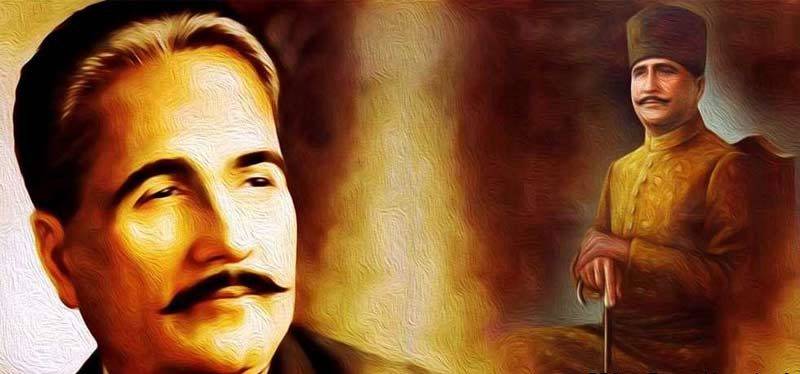
Sadia Nazir explores the vastness of Allama Iqbal's poetry in line with the concepts of nationalism and cosmopolitanism, as they have always been the main focus of thinker, poet and philosopher.
Cosmopolitanism has much tendency for cultural, historical considerations of particular languages and literature but it also focuses on globalized aims which do not shun historicity and nationhood rather transcends beyond it while being very much mindful of one’s peculiar nationhood as well.
For taking into consideration the national and global readings, I will choose the poetry of Allama Muhammad Iqbal in translation, by discussing his concepts of nation, Ummah, and Ego.
Allama Muhammad Iqbal was much influenced by western ideology and philosophy as well.
The translated versions of his poetry by A.J.Arberry and R.A. Nicholson gives us a deep understanding about the globalist tendency and appeal of his translated versions of poetry which is not only regional rather transcends beyond the nationalist boundaries.
Concepts of nationalism and cosmopolitanism in relation to Ummah have always been the focus of thinker, poet and philosopher Allama Muhammad Iqbal. Islamic ideology cannot be restricted to geographical boundaries. Multiple Islamic states with defined concepts of nationhood and nationalism give a nuanced understanding of nationalist and trans-nationalist goals which leads to Pan-Islamism.
Whatever defines us as nation is religion and paradoxically this territorialization of nation on the very ideology of religion, somehow, transcends beyond the nationalist geographical boundaries, thereby, being transnational, cosmopolitan and global, as he also appears to be talking about carnival human sub-layers of consciousness and its recognition through ego, which is not solely an Islamic ideology rather invoking general human psychology and very much cosmopolitan in nature.
Humanity needs to recognize itself through self-transformation by means of constant upward movement and continual growth which knows no stasis.
Free will of man does not enslave him to static notions of destiny where he is destined to accept the fated notions of reality; rather he is the maker of his destiny. When he goes through the process of self-recognition by finding Khudi (Ego) which means when he finds himself and by finding himself, he finds Creator and then all forces of creation come forward to contribute in his struggle and conspire to fight for his goals as he finds all forces of nature at his disposal and service.
The translated versions of Iqbal help a comparative literature student to look for not only a historicized, indigenous aspect of the poet, his nation and Ummah but a growing tendency towards universal human psychological needs in the form of upward movement of Ego that looks for fresh possibilities in the world by invoking Free Will. This approach is very much cosmopolitan in nature.The poetry of Iqbal in Persian language shows us more a philosophical aspect of the poet and this angle has global, cosmopolitan and universal appeal.
Cosmopolitanism has much tendency for cultural, historical considerations of particular languages and literature but it also focuses on globalized aims which do not shun historicity and nationhood rather transcends beyond it while being very much mindful of one’s peculiar nationhood as well.
For taking into consideration the national and global readings, I will choose the poetry of Allama Muhammad Iqbal in translation, by discussing his concepts of nation, Ummah, and Ego.
Allama Muhammad Iqbal was much influenced by western ideology and philosophy as well.
The translated versions of his poetry by A.J.Arberry and R.A. Nicholson gives us a deep understanding about the globalist tendency and appeal of his translated versions of poetry which is not only regional rather transcends beyond the nationalist boundaries.
Concepts of nationalism and cosmopolitanism in relation to Ummah have always been the focus of thinker, poet and philosopher Allama Muhammad Iqbal. Islamic ideology cannot be restricted to geographical boundaries. Multiple Islamic states with defined concepts of nationhood and nationalism give a nuanced understanding of nationalist and trans-nationalist goals which leads to Pan-Islamism.
Whatever defines us as nation is religion and paradoxically this territorialization of nation on the very ideology of religion, somehow, transcends beyond the nationalist geographical boundaries, thereby, being transnational, cosmopolitan and global, as he also appears to be talking about carnival human sub-layers of consciousness and its recognition through ego, which is not solely an Islamic ideology rather invoking general human psychology and very much cosmopolitan in nature.
Humanity needs to recognize itself through self-transformation by means of constant upward movement and continual growth which knows no stasis.
Free will of man does not enslave him to static notions of destiny where he is destined to accept the fated notions of reality; rather he is the maker of his destiny. When he goes through the process of self-recognition by finding Khudi (Ego) which means when he finds himself and by finding himself, he finds Creator and then all forces of creation come forward to contribute in his struggle and conspire to fight for his goals as he finds all forces of nature at his disposal and service.
The translated versions of Iqbal help a comparative literature student to look for not only a historicized, indigenous aspect of the poet, his nation and Ummah but a growing tendency towards universal human psychological needs in the form of upward movement of Ego that looks for fresh possibilities in the world by invoking Free Will. This approach is very much cosmopolitan in nature.The poetry of Iqbal in Persian language shows us more a philosophical aspect of the poet and this angle has global, cosmopolitan and universal appeal.
